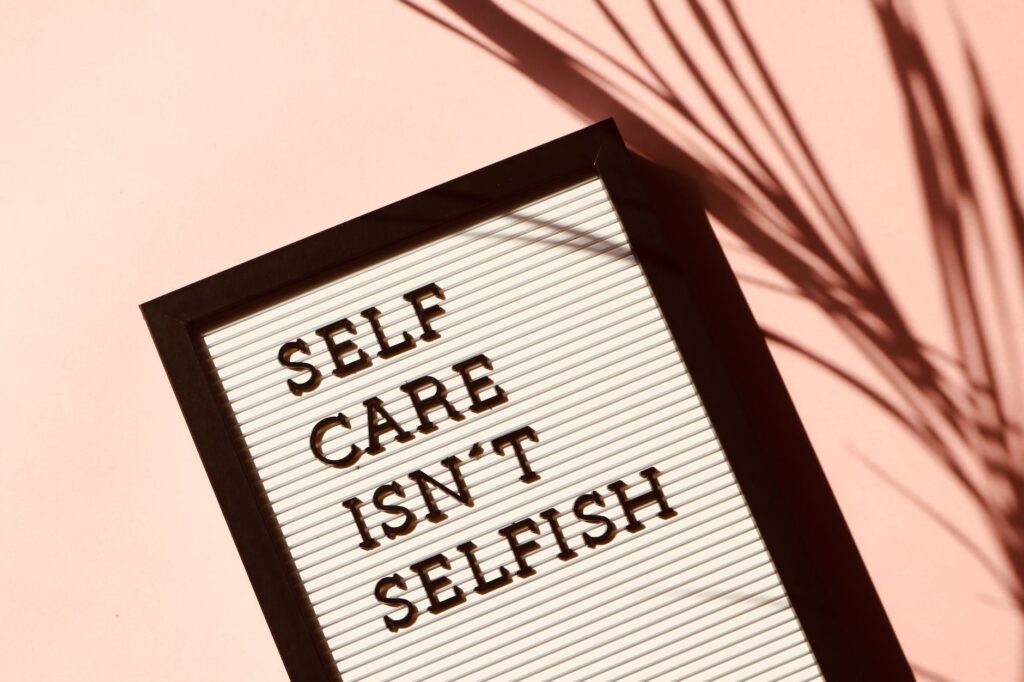
Photo by Madison Inouye on <a href="https://www.pexels.com/photo/self-care-isn-t-selfish-signage-2821823/" rel="nofollow">Pexels.com</a>
In my last article (How to Fight Mental Health Stigma, part 2), I talked about sharing our story about mental illness or mental health challenges to educate people around us and help fight mental health stigma. It this article, I want to put emphasis on the importance of storytelling.
Our stories make us human.
Collectively and individually, we have multiple layers and stories that make us who we are and while each year 1 in 5 Canadians experience a mental illness or mental health issue, 5 in 5 of us – that’s all people – have mental health. Sharing personal experiences and stories about mental health and mental illness is not only valuable for promoting understanding — it can help us see the world from different perspectives. Our stories can be shared in many different forms – written, spoken, or through music, art, movement, nature, and more.
Storytelling supports mental health and reduces stigma.
Sharing stories and experiences with each other, especially of difficult times and challenges, can benefit a person’s mental health and help others feel like they are not alone. For those struggling with mental health challenges, hearing others’ brave stories can offer a sense of comfort and solidarity that helps to reduce feelings of isolation. The vulnerability we show in telling our stories gives other people hope, courage and strength to overcome their own struggles. The more we share stories of the challenges and difficulties we’ve overcome, the easier it is to talk about such conditions and disorders. By hearing, seeing and learning of others’ experiences in the world through storytelling, we can destigmatize mental health and raise awareness of important issues, while encouraging individuals to seek help and support.
Also, trauma-counselling research has shown that the more someone shares, receives validation and feels understood, the faster they are able to heal. Firstly, it reduces the shame and self-stigma that can come with mental health challenges. Our stories let people know they are not alone in their struggles.
The Canadian Mental Health Association’s annual Mental Health Week
Did you know that each May, people across Canada rally around CMHA’s Mental Health Week? Inaugurated by CMHA in 1951, May 1-7, 2023 marks the 72nd annual Mental Health Week in Canada. Mental Health Week is a social change campaign to educate the public and shift beliefs and perceptions about mental health. It helps promote behaviours and attitudes that foster well-being, support good mental health and create a culture of understanding and acceptance.
The 2023 theme is MY STORY.
Mental Health Week 2023 and MY STORY will shine a spotlight on community mental health care programs, communities and voices while showcasing the importance of securing universal mental health care, what it can look like and how mental health care can be expressed and nurtured.
Get involved during Mental Health Week!
- Listen and support those who share their story with you, there is vulnerability, strength and benefits in these interactions;
- Share your story with someone close to you, this helps destigmatize the mental health conversation;
- Learn about different types of mental health supports and how they can be used to support you or someone in your community;
- Understand (the differences between) mental health and mental illness;
- Share a message of thanks for a community program or person who has helped you in your mental health journey.
Visit www.mentalhealthweek.ca for more information and to download resources.
Connect on social media using the hashtags #MyStory and #MentalHealthWeek.
DO YOU NEED MORE HELP? Contact a community organization like the Canadian Mental Health Association to learn more about support and resources in your area.
The information provided is not a substitute for professional advice. If you need advice, please consult a qualified health care professional. For further information or if you want to access our services at CMHA, please call 1-800-493-8271 or visit our web site at www.cmha-east.on.ca If you are thinking of suicide, please call 1-833-456-4566 toll free in Canada or dial 911.













